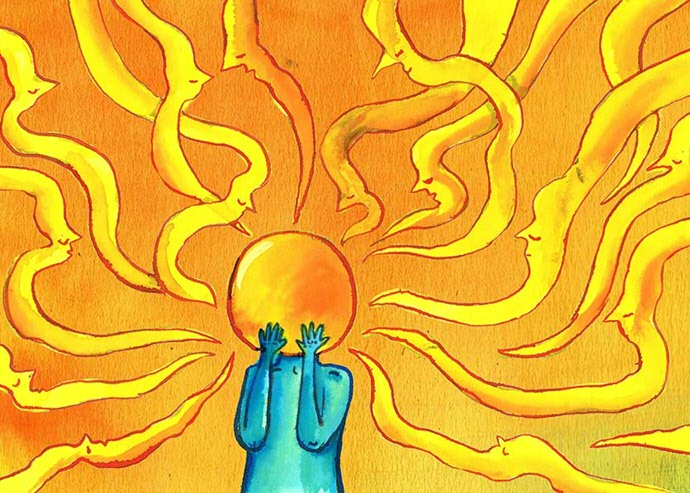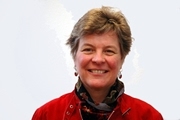PhD ceremony Eva Ouwehand: Mania and Meaning

Nowadays, there is more and more room for a focus on finding meaning in health care. In mental health care (GGZ), however, the practical development of this theme is still in its infancy. Eva Ouwehand hopes to contribute to this development and wants to find out how the results of her research can be implemented in actual care. On 30 January, she will be awarded a PhD by the Faculty of Theology and Religious Studies for her dissertation on religious and spiritual experiences in people with bipolar disorder.

Note: In the afternoon, there will be a symposium on this subject in the Doopsgezinde Kerk; more information on the symposium can be found below this message.
What effects do religious experiences have on life?
Eva Ouwehand studied Theology in Groningen when the faculty was still based on the Nieuwe Kijk in ‘t Jatstraat. ‘My major was pastoral psychology/psychology of religion, with religious studies and modern Christian art as minors. After I had completed my studies, I started working as a spiritual carer – I now work for Altrecht and Fivoor. For my PhD research, I again chose the University of Groningen and this faculty because of the supervisors: Hetty Zock, whose focus as a professor is on mental health care, and Hanneke Muthert, who has worked as a spiritual carer herself. The topic of my PhD research is the result of what I encountered in my work: I met people with serious illnesses who had religious and spiritual experiences. I was curious about the effect of these experiences on people’s lives, and how they look back on these experiences once they are more stable. It turns out that a significant amount (66%) of the people with bipolar disorder who were involved in the research has had a religious or spiritual experience at one point. This can be an experience in which everything is connected, an experience of unity or an experience of the presence of God. These experiences usually occur during manic episodes. During a depression and during intramural hospitalization, however, people can feel as if they are cut off from these spiritual experiences and from God. Many people want to know more: are these genuine religious experiences or are they mainly connected with their condition? These experiences don’t have a lasting effect on everyone.’
Important experiences
For her dissertation, Eva Ouwehand researched the type of religious and spiritual experiences people with bipolar disorder have, how people interpret these experiences themselves, how these experiences influence their lives and how caretakers can help them find a balanced attitude toward these types of experiences. Together with a number of psychiatry students, she spoke with 34 people suffering from bipolar disorder. Based on the results of these interviews, she developed a questionnaire which was filled in by almost 200 patients who are treated at the Altrecht Bipolar ward. Based on her research, Eva concluded that medical interpretations of experiences are often intertwined with religious or spiritual interpretations for people suffering from bipolar disorder: ‘People experience contact with a different dimension, but at the same time they feel that this is enhanced by their disorder. It is very important for people to talk about these spiritual and religious experiences, but sometimes they are hesitant or find it difficult to do so. What these participants are looking for is respect for their religiosity and acknowledgement of their experiences, but also a critical sounding board to help them interpret their experiences. For many, these will always remain important experiences that tell them something about who they are and their place in the world.’
Professional and personal interest
In addition to her professional interest in the subject, Eva also has an (indirect) personal interest: ‘Religious and spiritual experiences also occur in people suffering from other mental disorders, especially psychotic disorders. For me, bipolar disorder is interesting because there is such a contrast between mania and depression, and because the experiences can be both positive and negative ones. Another reason why I find this subject interesting is because there is a tendency for psychotic disorders in my family. I have never suffered from psychosis myself, but the fact that the connection between psychosis and religion is present in my family made me curious about the scientific aspect of this.’
PhD ceremony
Eva Ouwehand will defend her dissertation, Mania and meaning. A Mixed Methods Study into Religious Experiences in People with Bipolar Disorder: Occurrence and Significance, on 30 January in the presence of her supervisors. The ‘multidisciplinary supervision committee’ consists of primary supervisors Prof. Hetty Zock , professor by special appointment of Religion and Mental Health, in particular in the domain of Spiritual Care, at the Faculty of Theology and Religious Studies of the University of Groningen, and Prof. Arjan Braam, professor by special appointment of Religion and Mental Health, with particular focus on psychiatry, at the University of Humanistic Studies in Utrecht. Arjan Braam also works as a psychiatrist at the crisis centre in Utrecht, as an educator in psychiatry and at Altrecht. In addition, he has been involved for more than twenty years in empirical research into the connections between religion and psychiatry in older people via the Longitudinal Aging Study Amsterdam at the VU University Amsterdam. Eva’s co-supervisors are Dr Hanneke Muthert , associate professor of Psychology of Religion and Spiritual Care at the Faculty of Theology and Religious Studies of the University of Groningen, and Dr Hennie Boeije, former assistant professor for the capacity group Methodology & Statistics of the Faculty of Social and Behavioural Sciences at the University of Utrecht, and director of the Care and Participation research programme at Nivel since 2015.
- When: Thursday 30 January 2020
- Starts: 11 a.m.
- Where: Academy Building
Symposium
Starting at 2 p.m. a symposium will take place at the nearby Doopsgezinde Kerk (Oude Boteringestraat 33) on this subject: Between heaven and hell. Religious and spiritual experiences in the context of mental health care. At this symposium, Prof. Lars Danbolt and Prof. Christopher Cook, two professors from a foreign university who will act as additional assessors and opponents at Eva Ouwehand’s PhD ceremony, will give a lecture. This is why both the PhD ceremony and the symposium will be conducted in English. Prof. Ralph Kupka, professor of Bipolar Disorders, will give a lecture on how the results of Eva’s dissertation relate to the treatment guidelines for bipolar disorders. Entrance to the symposium is free.
